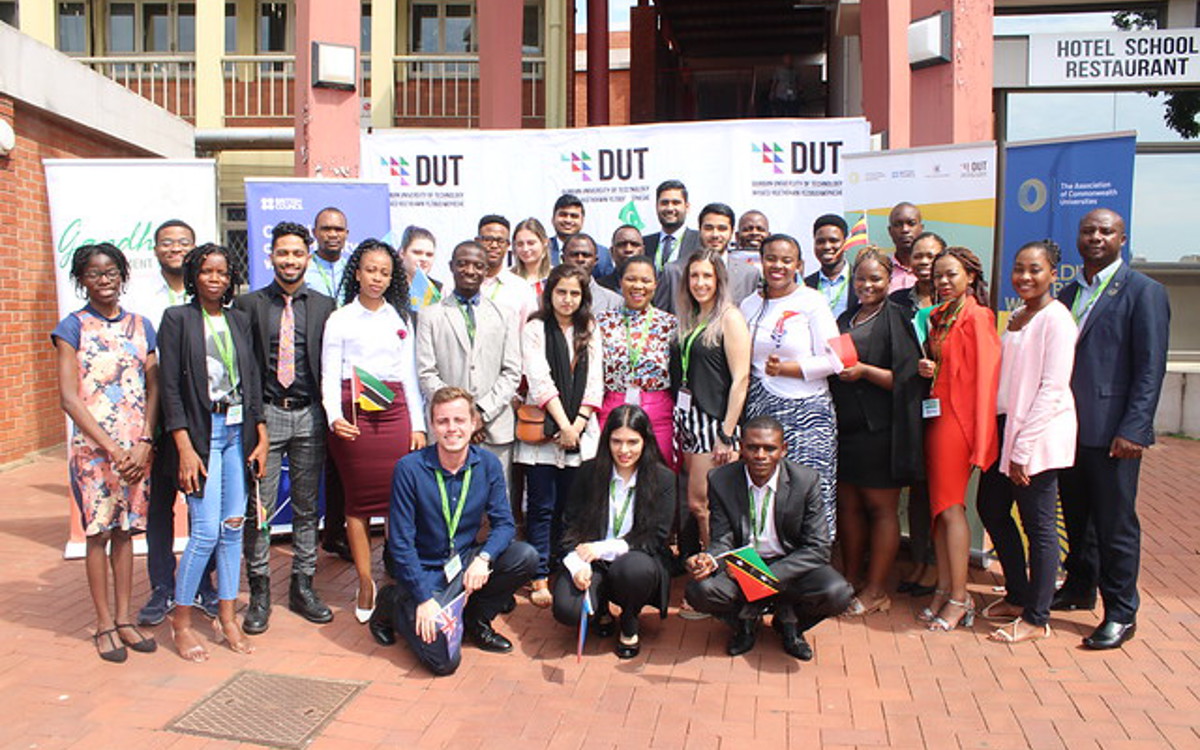The third workshop in the Commonwealth Futures series took place at Durban University of Technology, from 11-14 March 2020 on the theme ‘Commonwealth Futures: Reimagining Peace’.

The third Commonwealth Futures workshop, Reimagining Peace, welcomed 30 student leaders from 13 countries for an interactive, four-day workshop looking at the role of student leaders in building peaceful, cohesive societies. Taking place at Durban University of Technology (DUT) in South Africa, from 11-14 March, the workshop explored themes of violence and non-violence across different cultural contexts. Reimagining Peace was organised in partnership with British Council, DUT and the Commonwealth Secretariat.
The workshop brought together young change-makers from across the Commonwealth - each with an invested interest in driving positive social change in their communities and beyond. As remarked by ACU’s Head of Strategic Partnerships, Dr Faye Taylor, on the first day “You are all here for a reason”. Each student was nominated by their institution, all ACU members, for exhibiting leadership potential - from campaigning, to volunteering, social entrepreneurship and more.
Launched in 2019, Commonwealth Futures marked the 150th anniversary of the birth of Mahatma Gandhi – a Commonwealth scholar known for his position as a lawyer, activist, and advocate for non-violent resistance and the peace movement. Recognising students as agents for change lies at the heart of the Commonwealth Futures workshop series. With young people accounting for 60% of the Commonwealth’s 2.4 billion people, the voices of young leaders have never been so important. The ideas discussed and debated at the workshops will be embedded into the official dialogue presented at two global policy forums - both of which influence youth and higher education policy at local, national, regional, global and sector levels.
Reimagining Peace draws on Gandhi’s work on non-violence and peace-building. Over the course of four days, students engaged in meaningful discussion and debate about ways to drive peaceful and effective change. Interactive workshops and group-work facilitated by DUT’s International Centre of Nonviolence, the Gandhi Development Trust, and the Commonwealth Secretariat’s Countering Violent Extremism (CVE) Unit, prompted students to critically engage and reflect on their preconceptions of violence. Through group-work and discussion, the workshop provided students with a space to share their unique experiences and perspectives, discover commonalities across their different cultural contexts, and contemplate non-violent ways of communicating and collaborating across difference.
Local activists and analysts in the fields of gender, politics, and the environment, inspired students to think about ways to mobilise their power as leaders to build social cohesion. Drawing on their unique, multidisciplinary perspectives and expertise, the panel equipped students with practical advice on how to champion leadership for social change - from building sustainable networks, to avoiding toxic competition. As well as tackling global challenges, unique to this programme was the inclusion of the local context of violence in South Africa – as explored through an apartheid panel discussion. While much of these discussions were specific to South Africa, they raised a broader question as to how we disrupt long cycles of violence which transcend generations and societies.
On the final day, students presented group-projects on a key issue causing social division. Speaking from their position as both members of the Commonwealth, and students of higher education, the students worked together to collectively devise tangible solutions to shared global challenges - tackling topics such as gender-based violence, inequality in higher education, and economic inequality.
Solutions included equipping universities with a toolkit to respond to reported cases of gender-based violence on campus, including a smart phone with anonymous reporting; supporting economic and racial integration in neighbourhoods to address social division; advocating a holistic approach to gender based violence which includes both men and women; and harnessing social media to challenge perspectives surrounding gender bias.There was a strong push to include specific modules on developing student leadership within higher education curricula.
Youth leadership is integral to the future of the Commonwealth, which is why the outcomes of these presentations will directly contribute to two policy forums – the CHOGM (Commonwealth Heads of Government Meeting) Youth Forum in Rwanda and the British Council’s annual Going Global conference in London, UK.
Dr Faye Taylor, ACU Head of Strategic Partnerships reflected: “Accessing Higher Education is a privilege. It is clear that students recognise that their education brings with it huge responsibility, and that they are ready and willing to apply their considerable energies and talents to helping their communities. Meeting the young leaders here this week has been inspiring, but more policy makers need to hear their voices, their passion, and their ideas. We look forward to working with our partners – and most importantly, with student leaders themselves – to ensure they can play their fullest role in building cohesive societies.”
Meekness Lunga, Science and Higher Education Programme Manager at the British Council South Africa, added: “The voices of student leaders are more relevant and important than ever before given the current and future global challenges that the next generation of leaders will have to grapple with. Engaging with this unique group of 30 young leaders at the “Reimagining Peace” workshop at Durban University of Technology was quite energising and exciting. All the young leaders demonstrated great passion and potential to effect positive social change in their communities. I look forward to hearing more about their continued journeys!”
Professor Sibusiso Moyo, Deputy Vice-Chancellor and Principle for Research, Innovation and Engagement at DUT, remarked "DUT was delighted and honoured to host the Commonwealth Futures workshop in Durban, South Africa on Reimagining Peace. As a university, we are well positioned to host this workshop due to the work being done both nationally and internationally in this area. Commonwealth Futures provides a platform for our youth, both at DUT and Commonwealth universities, to come together and find solutions to common regional challenges where impact could be made."
Learn more about Commonwealth Futures
To get involved with the conversation, follow the #CommonwealthFutures hashtag.
